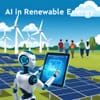Artificial intelligence is revolutionizing the renewable energy sector by improving forecasting, grid stability, and operational efficiency. With the global renewable energy market projected to grow from $1.34 trillion in 2024 to $5.62 trillion by 2033, AI is playing a crucial role in this expansion. By leveraging advanced machine learning algorithms, AI enhances every stage of the value chain, optimizing forecasting of solar and wind output, enabling predictive maintenance to minimize downtime, and enabling smart grid management to balance supply and demand efficiently.
AI analyzes vast amounts of data from renewable energy systems, including solar panels, wind turbines, and energy storage devices, to identify patterns and trends that would be difficult or impossible for human engineers to detect. This helps renewable energy companies optimize their systems for maximum efficiency and sustainability. For instance, Google's DeepMind has successfully integrated AI to enhance solar power generation, resulting in a 20% boost in efficiency.
AI-powered predictive maintenance helps operators reduce downtime by up to 30% and maintenance costs by 20%. By detecting anomalies in real-time sensor data, AI prevents failures before they occur, extending asset lifespan and maximizing efficiency. Companies like Vestas, a leading wind turbine manufacturer, have adopted AI-driven predictive maintenance to optimize turbine performance.
AI is transforming grid management by analyzing weather forecasts, market dynamics, and consumption patterns to optimize grid operations continuously. Intelligent agents balance supply and demand with precision, ensuring a stable and efficient power supply. Siemens is applying AI in the management of energy storage systems, predicting energy demand and adjusting storage accordingly to ensure reliability at a lower cost.
AI enhances the efficiency and reliability of energy storage systems by analyzing usage patterns, energy prices, and weather forecasts to determine optimal times to charge and discharge batteries. Tesla's Autobidder, an AI-powered platform, ensures energy storage assets are used optimally, maximizing battery lifespan while optimizing expenses.
The future of sustainable power lies in autonomous optimization, where AI-driven systems self-adjust to maximize efficiency and profitability. As the renewable energy sector continues to grow, AI will play an increasingly important role in driving innovation and reducing costs. With its ability to analyze vast amounts of data and make real-time decisions, AI is set to revolutionize the way we generate, distribute, and trade renewable energy.


